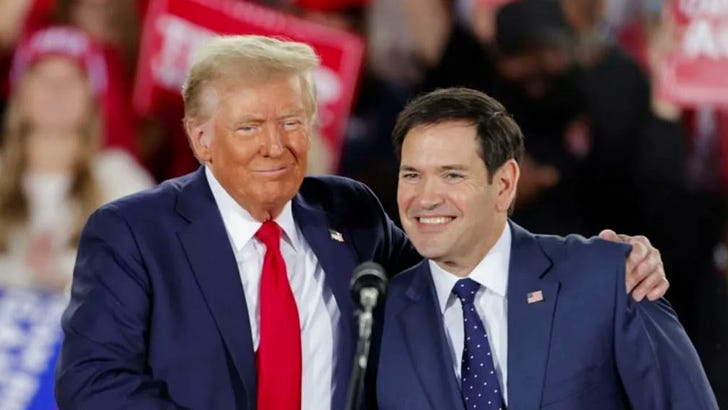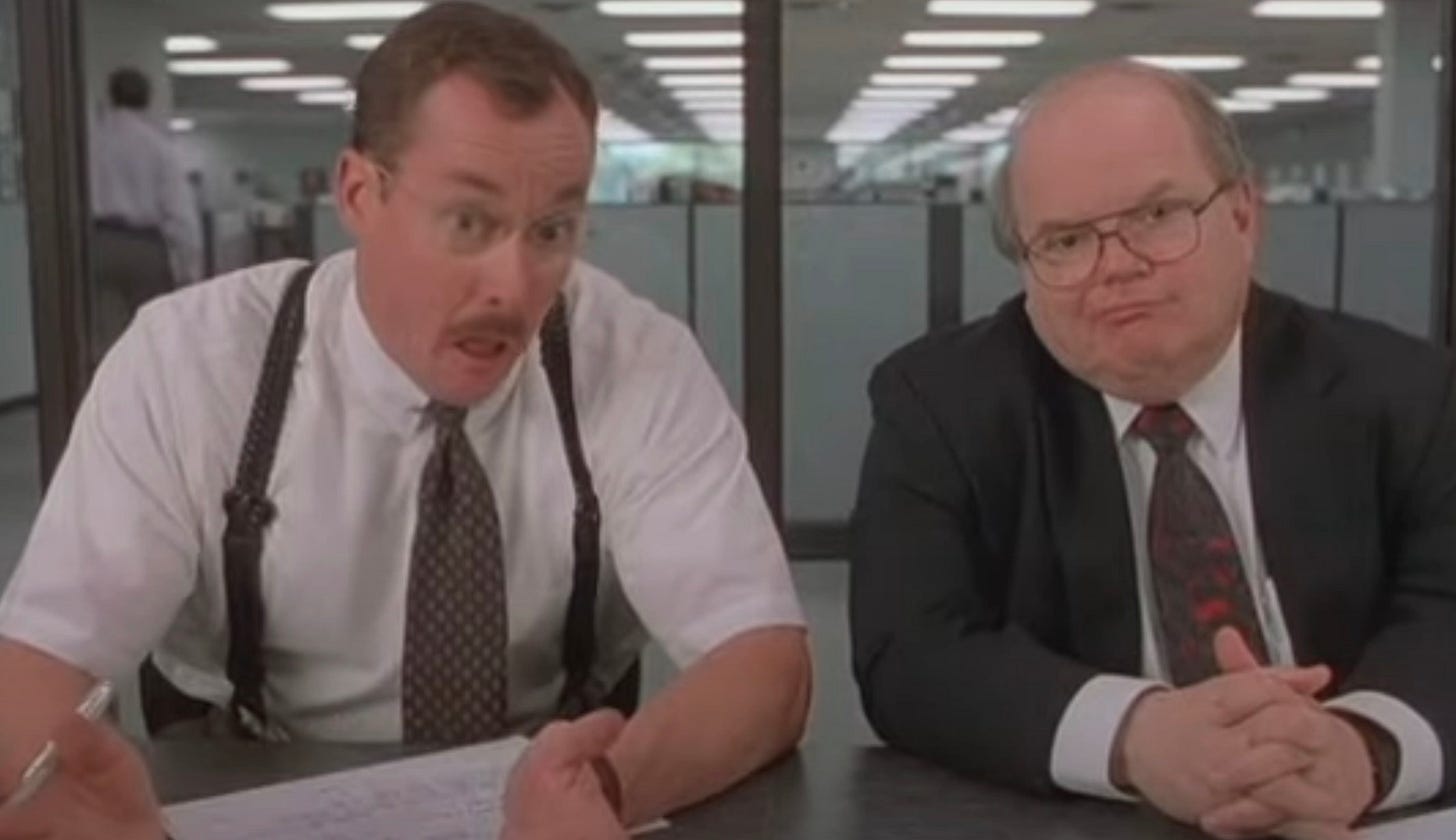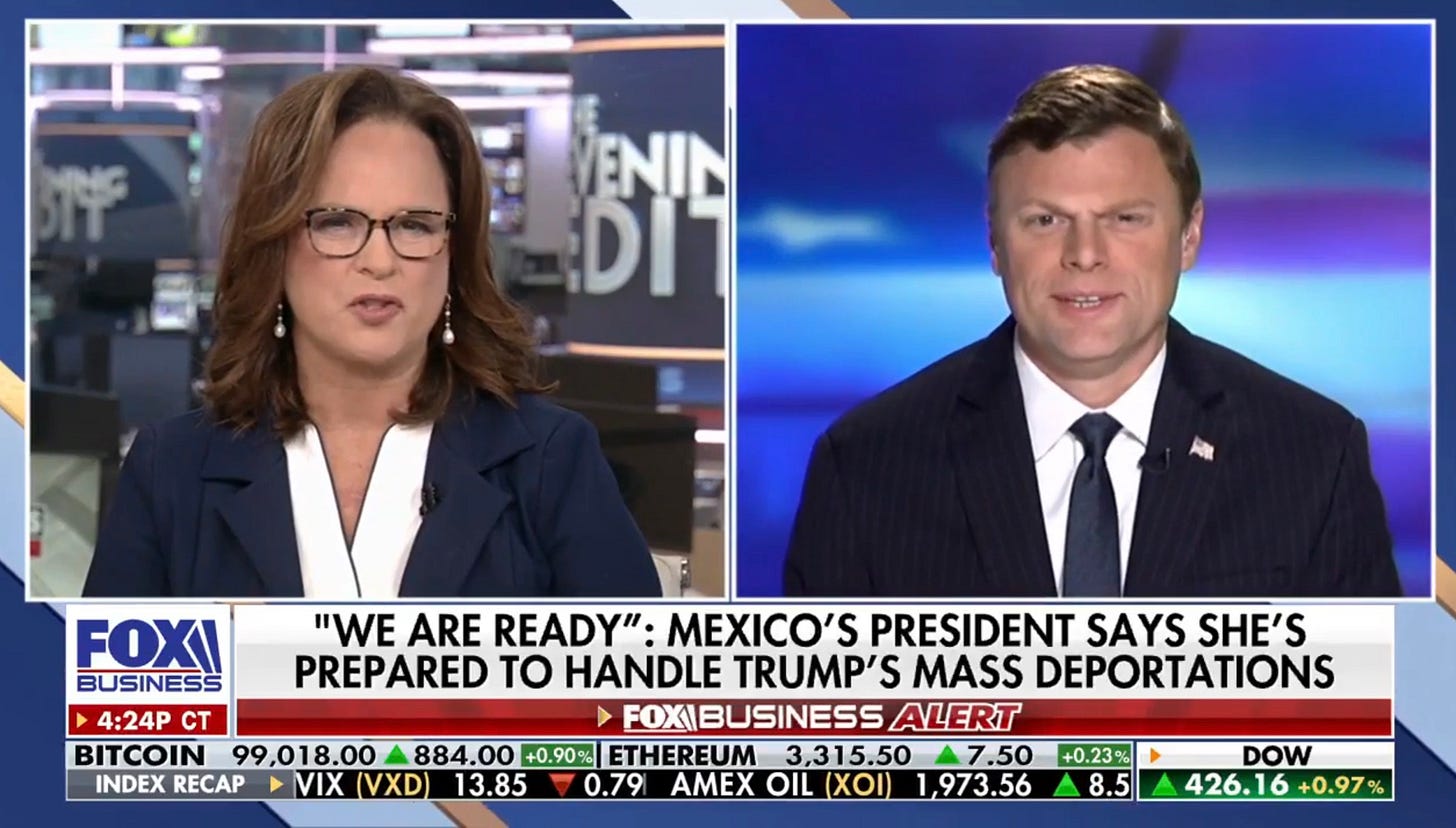Trump Already Winning With Tariffs and Strong Transition
Elf prince turns Denver into poo capital. Preview: podcast episode with Jeff Berkowitz.
The Lead-In (Domino Theory): “The Trump transition is well under way with less than two months to go until inauguration day. Recently, Trump announced that he would enact 25 percent tariffs on Mexico and Canada if they don’t stop the flow of illegal immigrants and fentanyl. Trump also put China on course for a 10 percent increase in tariffs.
The market and tariff skeptics hoping for the best wrongly took this to be a step-down from Trump’s previous plan to put 60 percent tariffs on China. But if you look at the wording of his announcement, it seems like he means that this 10 percent fentanyl surcharge will be on top of his other plans.
Trump lost one nominee, Matt Gaetz, who will not be attorney general. Instead, he intends to nominate Pam Bondi, the tough but otherwise uncontroversial attorney general of Florida to lead the corrupt Justice Department. Senators made it clear to Trump’s team that all 47 Democrats would have voted against Gaetz, and he would have lost four or more Republicans, which is the threshold to doom any nomination.
For the Pentagon, Trump has nominated Pete Hegseth, a military veteran and Fox News host. Hegseth will be the second-youngest SecDef and one with the most unusual background. Democrats are attacking him based on a lack of experience with big organizations and they are also mounting an ineffective MeToo smear campaign against him.
Previously: Hegseth Should go to Hill With Team and Vision
Trump’s nominee for the State Department is more conventional and could pass the Senate with unanimous consent. While there was speculation Trump might choose a more firebrand top diplomat like my friend Ric Grenell, instead the former and future president took Senator Marco Rubio’s hand into his much-larger hand and said, “You’re my choice Marco.” We’ll talk more about what this means in the discussion.
Tulsi Gabbard, the former Democrat congresswoman from Hawaii, will be the Director of National Intelligence. That office has ranged from pointless to counterproductive since its creation in the wake of intelligence failures that led to the 9/11 attacks.
On the economic side of the administration, Trump has chosen Scott Bessent to be Treasury Secretary. Wall Street seems relieved and believes this to be a conventional pick. I think he might be better than that. Bessent is an iconoclast who at times has won big by betting against the market and has endorsed Trump’s tariffs, which remain heresy in the editorial pages of both the Wall Street Journal and New York Times, at least the last time anyone checked. Bessent supported Al Gore in 2000, but would be a major Trump contributor by 2017. He’s gay, married, has two kids, and lives in a restored mansion called the “Pink Palace” in Charleston. Not your average finance bro, which is nice.
Over at the Commerce Department will be Howard Lutnick, also a veteran of Wall Street. Commerce typically is less important to American business and finance than its name implies. There used to be a joke that every new secretary thought he had a big budget until he was informed that a huge chuck was earmarked to something called the “National Oceanic and Atmospheric Administration.” Since then, “NOAA”’s budget has actually been eclipsed by the Commerce Department’s handouts to semiconductor companies and something called “broadband equity,” but that is another story—probably one for Elon Musk and Vivek Ramaswamy and their Department of Government Efficiency.
Commerce became more relevant during Trump One after it fell behind the U.S. Trade Representative’s office in screwing China and then caught up by enacting export controls on semiconductors made anywhere in the world with any U.S.-produced tools. Trump’s announcement of Lutnick said, “He will lead our Tariff and Trade agenda, with additional direct responsibility for the Office of the United States Trade Representative…” This arrangement is unprecedented as the U.S. Trade Rep is usually a direct report to the president and a member of the cabinet. We’ll try to discern the implications of this.
If you zoom out, you see a president-elect that is putting activists and reformers in each of his key agencies. He is placing energy and loyalty above experience, especially government experience, which isn’t necessarily bad. Certainly, he seems determined to avoid the pitfalls of personnel failures in his first term. Friends involved in the transition report a new process that is nonetheless chaotic and opaque, even to insiders. On the other hand, it has only been a few weeks since the election, Trump has most of his team assembled, and the usual bedwetters are wetting their beds. So, he might be on to something.
See below for excerpts of this episode of Domino Theory with guest Jeff Berkowitz. Full episode coming soon.
Denver Poo Capital Mayor
When you think of downtown Denver, what comes to mind? Bums, heroin zombies, and poo on the streets. Instead of the get-tough policies needed to fix these problems, Denver’s little elf prince of a mayor, Mike Johnson, is preening about his opposition to Trump’s immigration plans—the same ones that polls show most Americans support including the major poll just conducted known as the presidential election.
One problem is that Johnson doesn’t just have stupid policies. He may in fact be stupid.
First of all, he said that the 50,000 Denverites would forcibly resist the efforts to deport illegal criminals that Trump will enact. He said it would be like “the Tiananmen Square moment with the rose and the gun…” No such moment existed. Johnson is conflating the heroic and fatal stand Chinese took against their despotic government across China, including in Tiananmen Square, in 1989. I have spoken with some of those present and there were no roses in guns. That is hippie bullshit from late 1960s and early 1970s America. One effort (Tiananmen) opposed communism. The other (hippies and beatniks) aided communism.
Second, Johnson boasted of “having the [Denver Police Department] stationed at the county line to keep them out…” This would-be act of insurrection against federal law enforcement would never happen—either because the cops would desert, or because the adults in the state government would realize that Denver in particular and Colorado in general cannot be secure without the cooperation of federal law enforcement.
There are reports that the Trump campaign is looking to punish municipalities and states that proclaim themselves “sanctuaries.” This is little different than the states that rebelled when Abraham Lincoln was elected and should be handled severely. Unlike in Lincoln’s day, states with dump cities like Denver are deeply reliant on federal handouts for everything ranging from transportation to welfare to cushy benefits for bums. Federal aid need not be canceled; it need only be delayed slightly to bring urban dumps to heel. Let’s hope that happens—and that President Trump moves decisively to bring law and order to U.S. cities in way that Democrat mayors have failed to do. That plus the installation of pro-Trump U.S. Attorneys in these cities might create political space for urban Republicans.
On Fox Business, I discussed the matter. Take a look at video linked above.
Some excerpts of the Domino Theory podcast with guest Jeff Berkowtiz. Full episode coming soon.
Jeff Berkowitz on what is different about the Trump Two transition:
I think it's something that's new to American politics, but should be very familiar to Europeans, which is, this is what we've really been telling clients is you have to think about this cabinet as a European-style coalition government, because that is a reflection of the realignment coalition that elected Trump, right? He got RFK support. He got Tulsi Gabbard support. He got support from; this was the first time in a very long time, the Republican candidate for president won a majority of the lower income and middle-income Americans versus the upper income.
So you're seeing that realignment reflected in the cabinet. Yeah, I like to say the first term was mostly traditional Republican policies with very different populist rhetoric. This is going to be truly a populist agenda. And you're going to see, but the challenge is going to be just like European style coalitions. You're going to have these different agencies’ different heads occasionally working at cross purposes.
Jeff on Trump taking a harder line on Mexico and Canada over illegal immigrants and flooding America with fentanyl—and expectations for what’s ahead:
I think the media constantly misunderstands Trump's approach to things. He doesn't declare these policy things because that's what he necessarily wants to do. He declares it because he wants a maximalist position from which to negotiate. He's never wanted to get us out of NATO. He's wanted NATO to be what it's supposed to be, which is a shared common defense in which the Europeans are paying what they should for their own defense.
And he achieved that. So I think the tariff policy is; he has that in mind, right? He doesn't want to break trade bonds with Canada and Mexico. He wants them to do what is their responsibility. They're part of the responsibility of our borders. He wants to go after China and the way they're cheating. Every American president has known how much China cheats. He was just the first one to say it out loud and mean it.
So where does that go next? I think Iran is going to, we're going back to maximum pressure. It was working. The Middle East is going to become a lot more peaceful, a lot, very quickly.
Jeff, Mark, and Christian discuss the nomination of Senator Marco Rubio to be Secretary of State:
Christian Whiton: Marco Rubio at State, which I think is a great appointment and it's nice. It's a Gen-Xer, which I like. It's someone who was a Trump opponent who's come around.
And you have someone who is a Tea Party class—I think he was first elected in 2010—and I think the Tea Party is a predecessor to Trump and maybe Buchananism and that was a predecessor to the Tea Party, but anyway, that's a different story. But with Rubio, you have someone who's probably still a click or two more interventionist than [Trump]…
He's great on human rights. Whenever we’ve gone up to see either his personal staff in the Senate or his staff on the Intelligence Committee where he was vice chairman (would have been chairman if Republicans had the majority)--always terrific people and presumably he's actually one of the few people who can bring a political network that has government experience.
Question is, does that matter? Is putting Rubio at State basically Trump saying he doesn't want State to be that consequential? I don't know. And just want someone to manage the lunatics and make sure they don't screw up what he's doing from the White House? Or does it mean he wants a more experienced voice around? I don't even know if Trump holds formal meetings of his National Security Council, but if he does, it would be Sec State, Sec Def, J.D. Vance, Trump, and then all the other people who he decides to add. What do you think? What does it tell us about diplomacy and State?
Jeff Berkowitz: I think he will hold them in this administration because he's going to look around the room and say, I can actually do this. These are folks are actually here to work for my agenda.
Marco Rubio, I think if you look at him now, I know some people would call him a neocon or one of these other things. I think he is a very effective defender of American values in the world. And that's very consistent with the America First agenda that Trump has in mind. He's been a big advocate of common good capitalism whether you agree with that reframing of free-ish market policies into more industrial policies as national security policy or not.
He understands that America has interests in the world and we should defend them. But that doesn't mean we should go fight everyone's wars for them with blank checks. And I think, he's someone who I hope and think will be inoculated against the bureaucratic reach…
Lead-in to episode:
Full episode coming soon.








